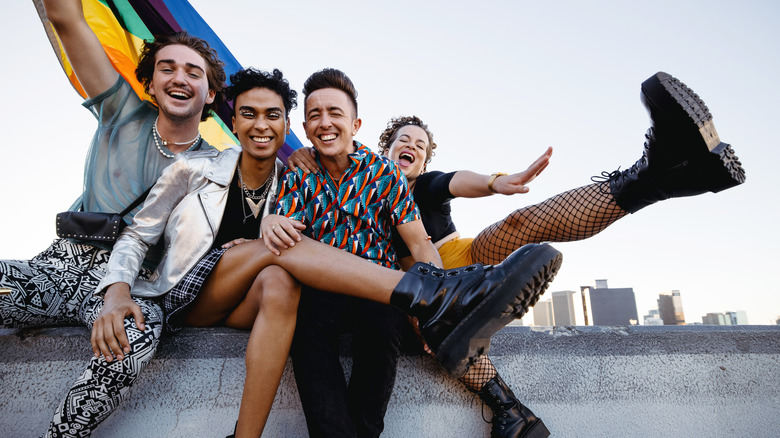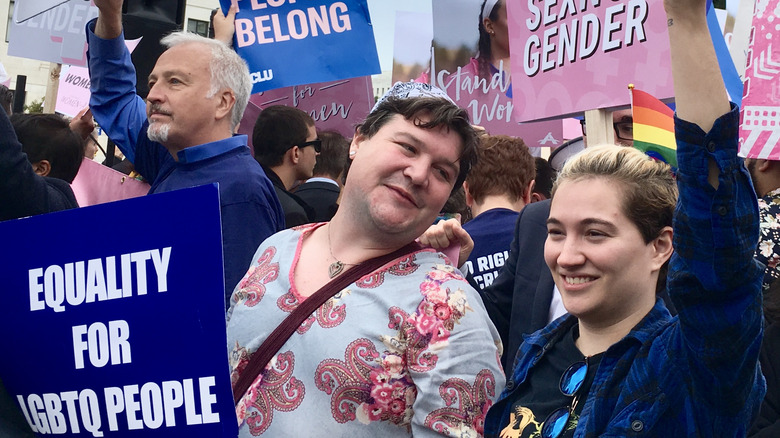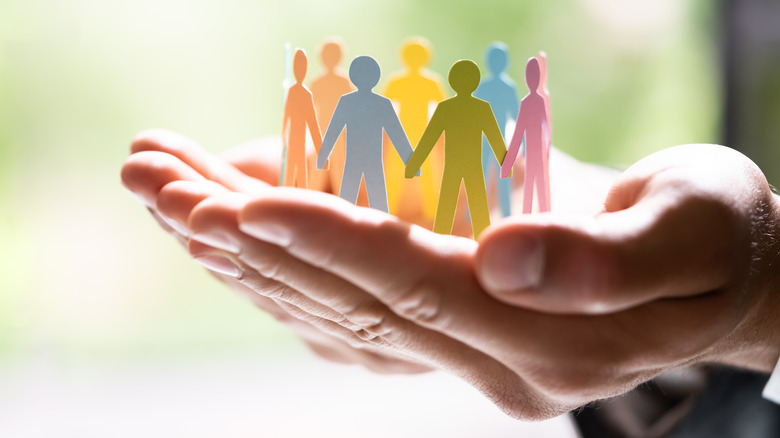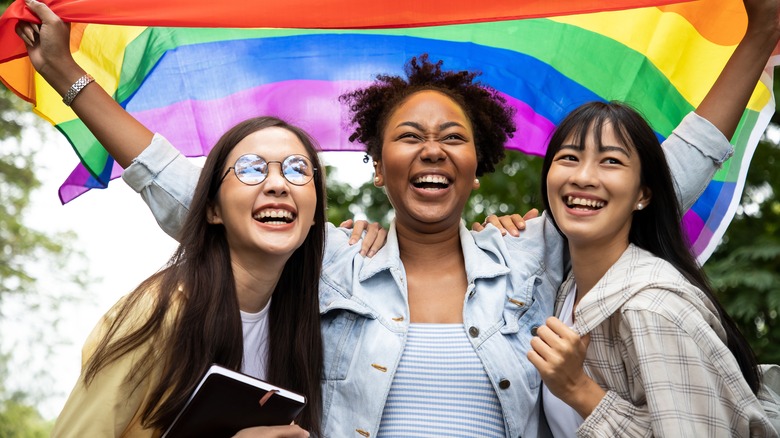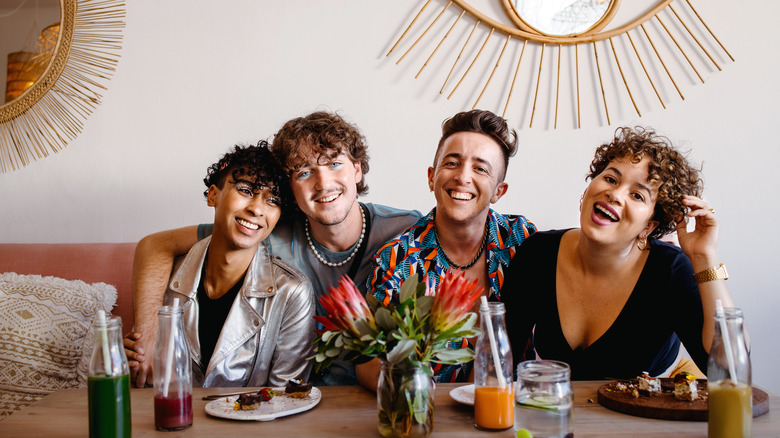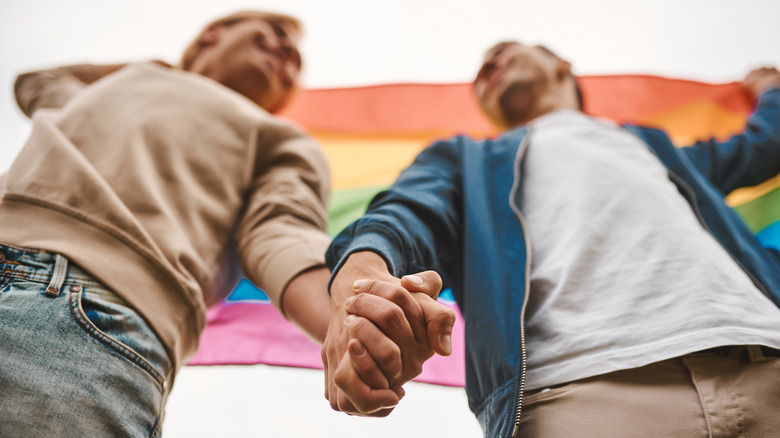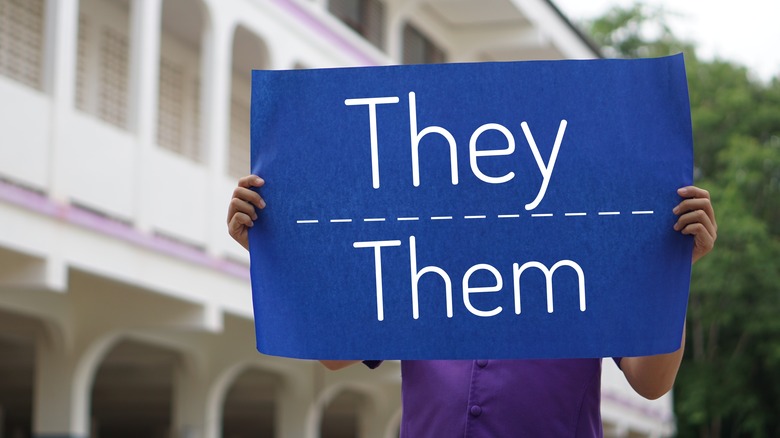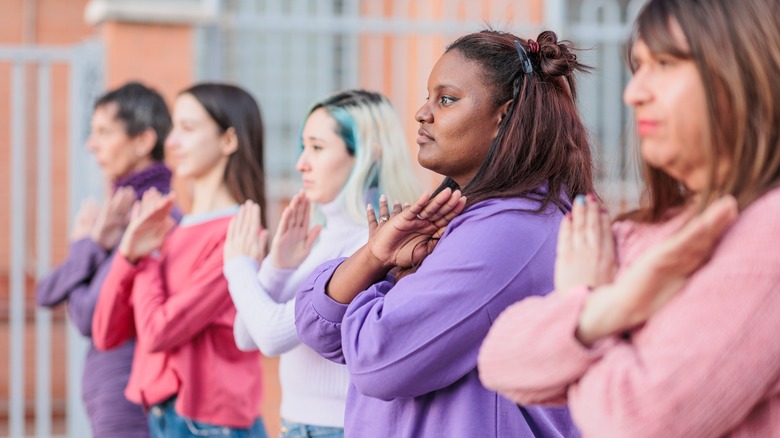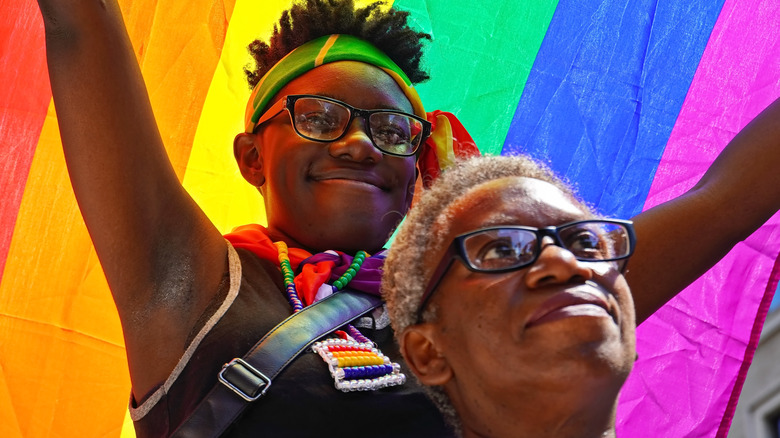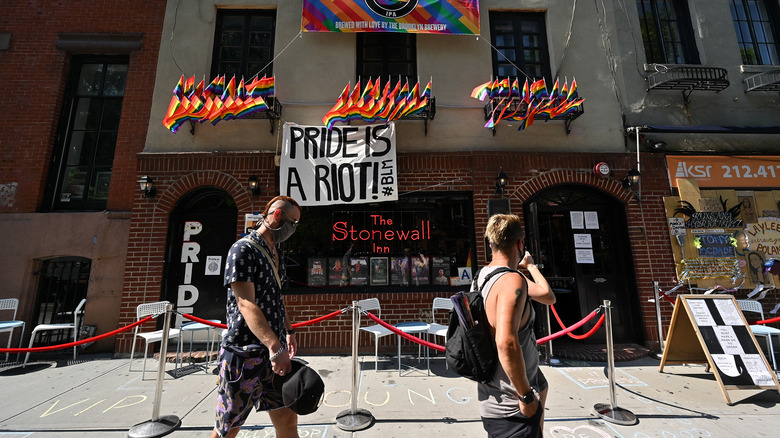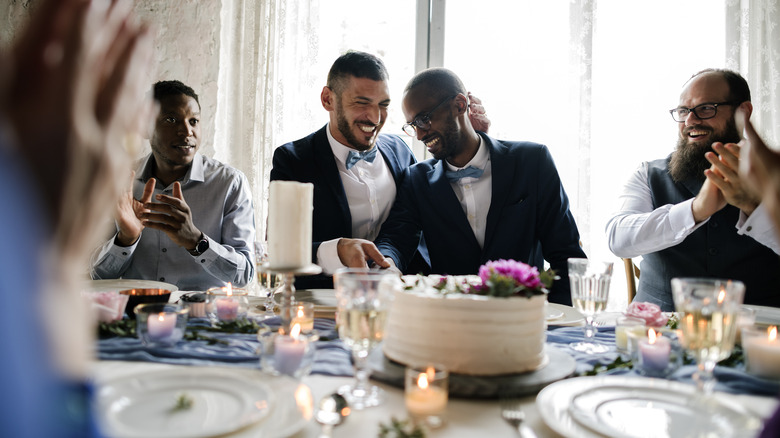Tips On How To Be A Better Ally This Pride Month
As another Pride Month arrives, you may be wondering what you can do to become an LGBTQ+ ally or be a better, more supportive ally. Being an ally is a choice to rid yourself of bias and take a stand to call out bias and discrimination when you see it (via World Economic Forum). The world's attitudes toward the LGBTQ+ community are changing, but not fast enough. LGBTQ+ youth are still more likely to be bullied on school grounds and through cyberbullying (via StopBullying.gov), and LGBTQ+ adults are four times more likely to be victims of violence when compared to non-LGBTQ+ people, UCLA's School of Law has reported.
Allyship continues to be vitally important for the safety and well-being of the LGBTQ+ community, but being an ally may look different in each situation. As an ally, you'll have to gain a deep understanding of what is needed of you from your friends, family, and the LGBTQ+ community at large. Here are a few helpful tips for how to be a better ally during Pride month and beyond (via GLSEN).
Be open to learning and be willing to change
In the guide "Being an LGBTQ Ally," the Human Rights Campaign has advised allies to be willing to learn about what it means to their friend or family member to be LGBTQ+ and ask respectful questions to gain a better understanding. If these are new conversations or it feels awkward for you, say so. If something makes you uncomfortable, take a moment to understand why the comment makes you uneasy, and let your friend or loved one know that you feel that way in order to prompt fruitful discussion.
In addition to outlining LGBTQ+ identities and history, the guide presents the idea of a queer person "inviting in" friends and family to know their identity rather than "coming out." While seemingly a small reframing of language, it can help ease the stigma that somehow being in the LGBTQ+ community is something to hide. Identifying as gay can be liberating for some people and difficult or traumatizing for others, so being a good ally means understanding that each person's timeline is unique.
Natalie Johnson and Dr. Evelyn Carter from Paradigm have written about building effective allyship skills, and they advise allies to re-learn the world from other perspectives and experiences. It's essential to learn to recognize the inequities that are present in the world and how they can affect a person's outcomes.
Become aware of your privilege
Being straight and cisgender (or when your gender aligns with the sex you were assigned at birth, according to Planned Parenthood) is a position of privilege. If you can go to a job, get married, and have children without fear of facing discrimination, you have privilege. It may be hard for someone who hasn't faced discrimination to understand what it can be like and how it can impact every aspect of their lives.
The University of California, Merced has shared some additional examples of heterosexual privilege for allies to study and understand. Thinking of your own life, have you ever had someone wonder about the cause of your sexuality? Has anyone ever asked you why you are straight or choose to be so open about it? How difficult was it for you to find a place to worship? These are questions sometimes posed to those in the LGBTQ+ community, and they can begin to shed light on some of the discriminatory encounters that people with heterosexual privilege do not have to face.
Be a good listener and know when it's time to speak up
Listening involves more skill than merely hearing a person's words. When you are in a position to be an ally, work on your deep listening skills, which can help put you in a position to understand, support, and learn. Adversarial listening, on the other hand, positions you to defend, resist, or oppose. When a person is talking, you should not be preparing your rebuttal or interrupting. Instead, listen for understanding and reflect or paraphrase what the speaker said. Check your perceptions throughout the conversation, ask open-ended questions that will invite discussion, and be aware of your body language as you react to the speaker (via Interaction Institute for Social Change).
The general life skill of active listening also comes in handy when being a great LGBTQ+ ally. Put away devices, make eye contact, and respond to the speaker to affirm that you are listening. If you have been deeply listening, you should be able to respond with feedback or follow-up questions to support moving the conversation forward and help the speaker feel understood (via Colorado State University Global).
Skip performative actions and take supportive actions
One of the best ways to show your support as an ally is to take action. Taking action means something different for each ally, and how you take action as an ally can change over time as you learn and grow.
One early distinction is that there is a big difference between supportive action and objectification of the community. Taking action isn't about wearing a rainbow shirt or engaging with similar marketing ploys. If you're new to being an ally, a good starting point is practicing fundamental advocacy. Correct people if you hear someone misgender a person, stand up to slurs or insensitive language, and promote diversity in your groups, including in the workplace (via Oprah Daily).
When you are ready to take further steps, perhaps consider joining a group that supports the LGBTQ+ community or attending a rally to speak out against harmful policies or legislation that endangers the LGBTQ+ community. GLAAD, The Trevor Project, The Center for Black Equity, Trans Lifeline, The Marsha P. Johnson Institute, and PFLAG are all organizations that accept donations and may be able to coordinate volunteers (via USA Today).
Hold yourself accountable for mistakes
Everyone is learning, and the world is continuing to change rapidly. Some words we say now were not necessarily in the common vernacular 20 years ago, such as "cisgender." There are a lot of mistakes to be made as the cultural norm changes, and it takes hard work and dedication to make corrections in both your mindset and vocabulary (via the University of California, Davis).
Trusted allies also take responsibility for any current and past actions — a move that shows great growth and accountability. In "A Guide to Being an Ally to Transgender and Nonbinary Youth," The Trevor Project has advised against trying to defend previous actions or intentions. Shifting the focus to your mistakes or making it about your apology takes away from the support needed by an LGBTQ+ individual. Instead, find out what your friend or loved one needs from you — perhaps to feel more included, represented, or understood. Communication is key.
Don't minimize the experience of anyone in the LGBTQ+ community
If your LGBTQ+ loved one reveals that they have faced discrimination or been harmed, believe them — and never try to minimize what they say. People can mistakenly make hurtful comments that are well-intentioned but sometimes fall short and show an unintentional underlying bias. For example, a friend or family member may mean well when they make a comment like, "I don't even think of you as gay," but there's a lot to unpack in that sentiment.
It shows that the person who said it thinks that gay is "other" or that there should be a certain aesthetic or personality that goes with being queer. The LGBTQ+ community is as diverse as humanity itself, and there is no single type of identity within the community. The comment can also invalidate a person's sexual identity.
Asking someone to minimize their appearance or behavior to be "less gay" is also wholly unacceptable. Queer people are often asked from a young age to hide their identity to make other people more comfortable. A 2009 study from the National Women's Studies Association Journal showed that academic faculty felt pressure to "cover" their sexuality in the work environment. According to the ACLU, this teaches shame and fear. As an ally, you can work to break this cycle in your family or workplace.
Don't make assumptions or get intrusive
Being a good ally means advocating for someone else's experience and identity, but it's best to let that person first tell you about their experience and identity. Don't assume you know a person's gender or identity or understand their lived experience. If unsure of a person's pronouns, offer yours first (via Chicago Tribune). If you want to be a progressive leader of gender equality and remove the power from the established binary gender roles, bypass the pronoun conversation altogether and start referring to everyone as they/them (via Fast Company).
It's also not wise to assume that because a person is LGBTQ+, they have a particular viewpoint, lifestyle, or political ideology (via American Bar Association). No one owes an explanation for their gender or personal ideologies anyway, so skip the intrusive questions unless you are extremely close and have established consent for being nosy, typically reserved for besties only.
Be respectful of pronouns and new names
When you are presented with pronouns, honor them. It may take some work to get it right, but it's necessary to correct yourself and everyone else every time to make the change. Practice talking aloud about the person using their new pronouns with a friend or loved one. If you are having a hard time switching to "they" because of your hardened grammar rules from primary school, try listening to podcasts that use nonbinary language so you can get used to hearing "they/them/their" used with ease (via Ask a Manager).
If you have a friend or loved one who has chosen a new name, respect the name change and don't use deadnames. Using the right names and pronouns creates a safe environment for a trans or nonbinary person. As an ally, be empowered to set the right example every time and support how a trans person is perceived in the community (via the University of California, Davis).
Defend your friends and loved ones
Be sure to speak up and defend your LGBTQ+ friends and loved ones if you hear or see any type of discrimination. However, be sure to honor that your position is not necessarily the same as that of the person facing discrimination.
If you are offended and want to address a rude remark before your LGBTQ+ loved one has said anything, it helps to speak for yourself and stay focused on your feelings rather than drawing attention to your friend or loved one. In the LGBT Ally Toolkit from Amnesty International, allies are encouraged to "step up" and say something when they hear jokes or attacks targeted at the LGBTQ+ community and to "step back" when a person from the LGBTQ+ community is speaking and expressing their opinion on the joke or attack. According to the LGBT Ally Toolkit, "Ally is a verb, not a noun."
Confront your biases and prejudices
In their "Safe Space Kit: Guide to Being an Ally to LGBT Students," GSLEN has addressed biases — and especially subtle biases — which exist all around us. Allies are encouraged to examine and understand their beliefs and ask difficult questions. For example, have you ever attended an LGBTQ+ support event? Why or why not? How would you react if your child came out as LGBTQ+? Have you ever laughed at or told a joke that targeted the LGBTQ+ community? Do you know any LGBTQ+ history?
Identifying implicit bias is the first step in working to change your mindset. The good news is that everyone is empowered to change their minds. For a deeper look at managing your biases, follow the American Academy of Family Physicians' eight tactics to identify and reduce implicit biases. You just might take time to become more introspective and mindful and see the world from the perspective of others.
Help to own the struggle
If there is oppression in the world, it affects every last one of us. To be an ally for the LGBTQ+ community means to help co-own the struggle and tirelessly work to create change for a better world. To help own the struggle means to transition from ally to partnered accomplice (via YWCA). Becoming an accomplice means assisting with creating the all-important space to promote inclusion — as if you have co-ownership of the struggle itself.
Another way you will know you are doing the work of a faithful ally is if you are not defining the work. Allies are led by moral imperatives, rather than praise or selfish notions, to make the world better for all marginalized groups (via Better Up). It takes consistent daily work over time to effectuate change in the world. Allies must show up every day, ready to continue the battle in whatever fashion they can.
Amplify oppressed voices
Maybe you've heard of the call to amplify minority voices, but you're wondering what amplifying means in practice as an ally. Harvard Business Review reported study findings suggesting amplification may improve workplace equity and inclusion for underrepresented groups. When people endorse each other's voices and perspectives and give credit where it's due, everyone involved may benefit from a status boost.
Amplifying others is also about making space and opportunity to hear from potentially underrepresented people. Dr. Llane Davey for Psychology Today has suggested setting firm boundaries for allowing everyone to speak and providing equal value to the comments in any group environment.
For educators, GLAAD has suggested including personal contributions from within the LGBTQ+ community in their curricula whenever possible. In your personal life, perhaps share meaningful posts from your LGBTQ+ loved ones on your social media and highlight pro-LGBTQ+ events. Even small steps to ensure minority voices and perspectives are honored in the same space as the majority are helpful.
Know your LGBTQ+ history
Pride parades are held in June to commemorate June 28, 1969, which was the beginning of the rebellion at the Stonewall Inn in New York City. Before that day, police had been regularly harassing gay patrons of the city's Stonewall Inn by arresting them during raids. The crowd fought back on that first night and continued to riot against police harassment for three consecutive nights, marking another significant LGBTQ+ resistance and perhaps the beginning of the fight for gay civil rights.
Two other major moments in LGBTQ+ rights' history that preceded Stonewall include the riot at San Francisco, California's Compton's Cafeteria, a groundbreaking trans rights riot in 1966 (via the Guardian), and the Black Cat protests, which took place in Los Angeles, California (via the Los Angeles Times). As an ally, it's also important to remember that gay people have only had the right to be legally married since the 2015 Supreme Court ruling in the Obergefell v. Hodges case. The fight for LGBTQ+ rights is still extremely young and in need of committed allies.
Invite others into your life as allies
Let your friends, family, and coworkers know that you are an ally by announcing yourself as one. Openly display your pride for being an ally with the hope that you can invite discussion with others and grow your group. Join other groups, such as the Gay-Straight Alliance. The idea is to increase awareness and gather the support of other allies (via Youth Engaged 4 Change).
Openly being an ally also means living the life of an ally year-round. People who see you as an ally will likely expect you to make space for LGBTQ+ voices and stand up against discriminatory behavior even after Pride Month. Equally Wed has even suggested stopping following and supporting politicians, businesses, and policies that are anti-LGBTQ+.
Openly celebrate the successes and milestones of your LGBTQ}+ family and friends. Host and attend social events for your loved ones, such as engagement parties, weddings, and baby showers for LGBTQ+ couples. You'll meet other allies along the way as you celebrate together.

